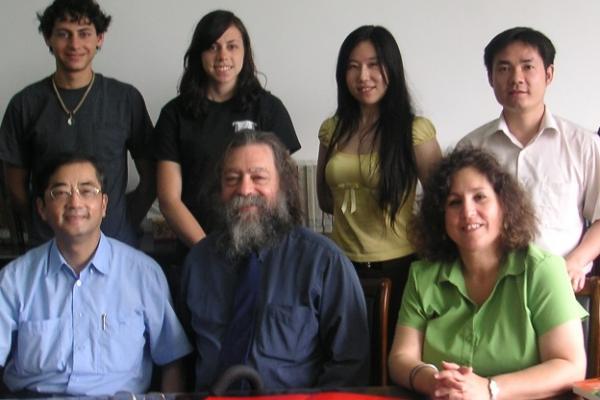April 17, 2018
In Memoriam: David Neal Miller

David Neal Miller z"l (1946-2018)
We honor the life of David Neal Miller. He grew up in Crown Heights within earshot of Ebbets Field. His New York roots were everything to him. ''I'm a Brooklyn boy,'' he was quoted as saying over and over again. From 1995-2013, Professor Miller administered a website, 1010 President Street, named for his childhood home. The site was a forum for other Brooklynites, present and former, to record their recollections of the borough.
Dovid Miller completed his doctoral studies at the University of California, Santa Cruz. He was not only a polyglot but a scholar and writer familiar with numerous literatures and cultures. In 1980, he took a position as an instructor at Ohio State and was quickly promoted to the rank of Assistant, then Associate Professor. A colleague in Germanic Languages and Literatures writes, “he certainly knew more about German literature than did his colleagues about his own fields of expertise. In the modern period he was an enthusiastic aficionado of Bertolt Brecht and epic theater. Having read most of Brecht’s poems and plays and having seen theater productions by the Berliner Ensemble in East Berlin, he was able to recite lines from Brecht’s plays and songs by heart. One of his favorites was Brecht’s libretto for Paul Dessau’s opera The Condemnation of Lucullus (the Roman general who after his death is tried by judge and jury in the underworld), from which Dovid was able to sing extended passages with conviction and zest.”
In the summer of 1980, before beginning at Ohio State, Dovid taught a course at SUNY-Albany, Great Yiddish Authors in English Translation, together with Isaac Bashevis Singer. In Columbus, Professor Miller taught Yiddish literature, Ashkenazic cultural studies, narratology, and critical theory courses. He offered many courses to expose students to Yiddish and Ashkenazic culture. Yiddish language, Literature in Translation, Yiddish culture, and Brooklyn: The Poetics of Place, were courses popular with undergraduate students. In 1984, Prof. Miller worked to initiate the Minor in Yiddish at Ohio State. Several years later, the Master of Arts became an option, and then a PhD since 1996, when Yiddish and Ashkenazic Studies moved to the Department of Germanic Languages and Literatures. Prof. Miller successfully directed the programs for many years. In 2006, Prof. Miller traveled to the People’s Republic of China and soon established a vibrant scholarly exchange. The first postdoc to engage in this exchange later returned to Shanghai and helped to reintroduce Jewish American studies to the PRC.
Dovid’s visiting appointments over the years included SUNY at Albany, Bar-Ilan University, Fudan University, Oxford University, and Vilnius University. He published A Bibliography of Isaac Bashevis Singer, 1924-1949 (1983), and Fear of Fiction: Narrative Strategies in the Works of Isaac Bashevis Singer (1985), as well as numerous articles on I. B. Singer; Sholom Aleichem; Y.-L. Perets; fictive discourse; interview as genre; and theory of allusion.
Prof. Miller’s service to the community included lectures and classes at the Jewish Center Yiddish Organization in Columbus, Congregation Beth Am, Congregation Tifereth Israel, Jewish Centers in Lima and Dayton, Ohio, B’nai B’rith Hillel Foundation, Congregation Beth Tikvah, and the Jewish Community Center of Greater Columbus.
Politically, Dovid was committed to justice for the oppressed. These included the poor, the weak, the disabled, the disconsolate, the underprivileged, the disenfranchised, and of course women. If his work focused primarily on the legacies of Ashkenaz extending from Vilnius to Brooklyn and beyond, he was just as concerned with the plight and suffering of those elsewhere, be they African-Americans or indigenous peoples in the Americas and others around the world. These attitudes were not merely ideological, but expressed themselves on a daily level in simple acts of kindness and generosity, on the Ohio State campus in particular, toward the thousands of students he taught over the years.
Nor was his commitment to the pursuit of knowledge and the truth restricted to a facile understanding of professionalism. For Dovid, the individual person, the human being came first, even if at the occasional cost of his professional advancement. During the extended illness and later death of his first wife Marcy J. Miller, he turned his full attention to the well-being of his family, and as a widower remained a benevolent father utterly devoted to the care of his two (then young) children Jacob and Rachel. When Dovid remarried, he found a loving partner in Renée Primack, who devoted herself to his care in every way. At a departmental meeting a few weeks ago, Renée helped Dovid into the room and then asked, "is there anything else you need?" Dovid answered, "your love." "You always have that," she responded.
Dovid will be sorely missed by so many. May his memory be a blessing.
